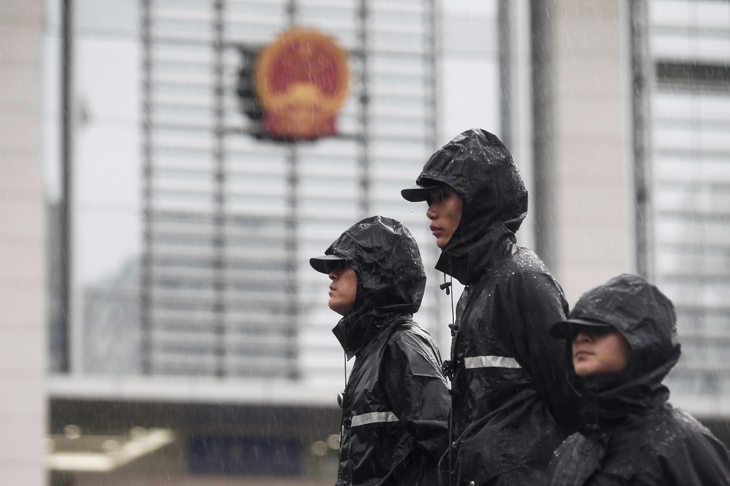It was the crime story that showed us just how much China has changed since its years of social, political and economic isolation. The discovery on 16 November 2011 of the dead body of the British businessman Neil Heywood in Room 1605 of the Lucky Holiday Hotel in the Chinese city of Chongqing was not in itself so shocking. Sordid maybe, as it was declared by the Chinese authorities that he had died of excessive alcohol consumption. But nothing more than that. The revelations that followed, though, transformed the case into an international cause célèbre, the inner workings of Chinese politics unravelling before the greedy eyes of the foreign media. Heywood, it has been suggested, was if not a spy then at least an ‘informer’ working for the British government. He did not die from natural causes but was poisoned by the wife of a leading Chinese politician who had been tipped for high office until her arrest and trial proved his undoing.
Carrie Grace’s five-part series for Radio 4, Intrigue: Murder in the Lucky Holiday Hotel (produced by Neal Razzell and Maria Byrne), was almost as shocking as the story itself. Slick, efficient and professional, it was also shaped very definitely for the podcast market and was very different in tone from the usual Radio 4 documentary. It was very listenable and hugely engaging, but the catchy soundbites and multiple voices, though livening up the storytelling, did not make its complex trail any clearer to follow.
We were taken first of all not to Beijing but to Bournemouth and a short interview with a balloon-seller who back in 2000 was approached by Heywood’s killer, the elegant but ‘dangerous’ Gu Kailai. She was in Britain because her son was at an expensive public school here, and on a whim had decided to import hot-air balloons into China to satisfy a growing demand for them. A strange way into the story, you might think. Heywood, it transpired, was employed as her middle man, a British man living in a provincial Chinese city who spoke fluent Chinese and was married to a Chinese wife.
‘Oh, it’s going to get wild,’ teased Grace. Cue slinky, seductive music in the background. We’re constantly told it was a difficult programme to make because the Chinese authorities did not want to talk about it, or have anyone else talk about it. ‘It is dangerous,’ Grace said. She interviewed the Italian owner of the restaurant in Bournemouth where Gu Kailai used to do her business, meeting her associates at ‘tables covered with red gingham cloths’ as she moved money to and from China. We heard from Peter Mandelson, who once had to negotiate with Kailai’s husband, Bo Xilai, who was by then minister of commerce in the Chinese government. He told a bizarre tale of his trade team (only about three of them) being deprived of food and water while his Chinese counterparts (numbering about 100) were fed vitamin tablets to keep them awake during their talks, which went on until 4 a.m., when, unsurprisingly, a deal was made.
The facts were all there, my attention was held throughout, but I’m still as confused as ever, and the occasional jokey tone was offputting, creating the suspicion that what we were hearing was rather more than the bare facts required.
At the other extreme, Sunday night’s feature on Radio 3, Opera across the Waves (produced by Clive Portbury), could not have been plainer or more straightforward. Yet by its end I not only felt I had learnt something new but the excerpts of music we heard were so tantalising and ravishing I was almost converted to Wagner.
Flora Wilson, an academic, told the story of opera on air, or more particularly how technology has always saved opera bringing it a bigger, broader audience. From its Renaissance origins (when architects were employed as designers), she argued, it has always been the spectacle, not just the music, through which our emotions are touched. Later, opera was transformed by travel — Italian singers flooding to London in the 1730s and across the Atlantic in the 1830s, so that by the turn of the century New York had become a musical capital hosting stars such as Caruso, Toscanini and Puccini.
Now, of course, live opera can be seen in the cinema, using sophisticated digital technology, making it cheap to see, but also a totally different sensory experience. As one fan remarked, ‘You see faces. You see eyelashes.’ But back in the 1930s it was radio that saved the Met in New York, the regular broadcasts of live opera getting it through the financial misery of the Depression years. In the first-ever live radio broadcast in the United States of an opera (Hansel and Gretel), on Christmas Day 1931, the producers were so worried the listeners would not be able to follow what was going on that the announcer talked across the music explaining in detail what was happening on stage. Not afterwards. Listeners wrote in to the station in their thousands declaring that they were quite able to use their own imaginations, thank you very much. Because of course on radio, ‘You can invent your own dragon.’






Comments